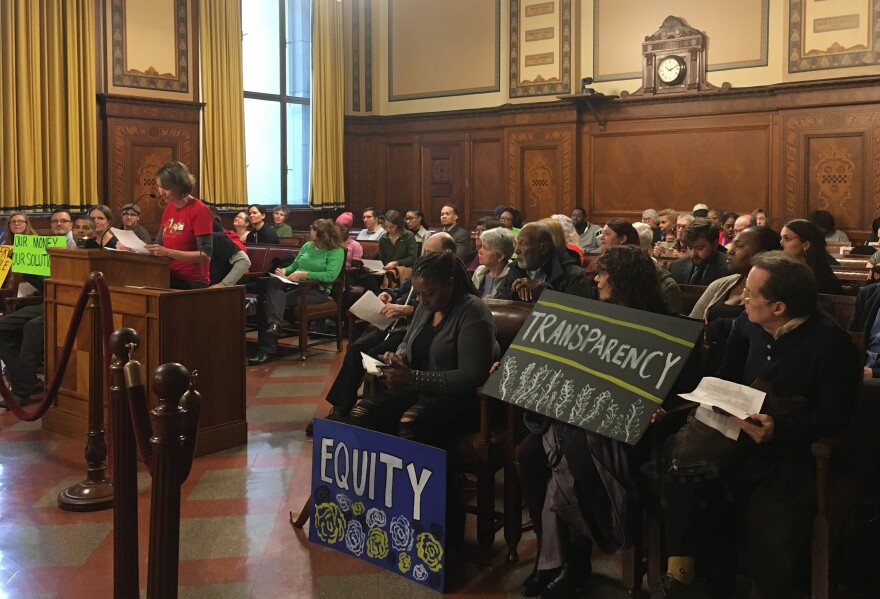At a public hearing on Pittsburgh’s proposed budget for 2020, dozens of residents called on city officials to show how its spending supports the values of equity and inclusion.
During more than two hours of public comment, speakers called on city councilors to ensure the budget’s investments address food insecurity, climate change, housing shortages and basic infrastructure needs.
A majority of speakers asked council to reconsider a plan to build a transportation connection between Oakland and Hazelwood Green, asserting that money for the Mon-Oakland Connector would be better spent on sidewalks and bus service.
The plan proposes to run shuttles from Oakland and Panther Hollow through Schenley Park and the Run, the lower part of Greenfield, before continuing through Hazelwood to Hazelwood Green. The idea has drawn significant resistance from residents since news of the concept first surfaced in 2015.
“It’s supposed to fix our transportation problems,” said Teaira Collins of Hazelwood. “The thing is, I’ve never heard anyone in Hazelwood complain that there isn’t a road for private companies to run shuttles through Schenley Park,” she said, referring to the lack of detail about who would operate the proposed vehicles.
Another Hazelwood resident and business owner, Dylan Rooke, said community members who have resisted the project or demanded more information have been accused of being afraid of change.
“We are not afraid of change; we welcome change, we welcome opportunity,” he said. Instead, the city has to change how it approaches development by starting discussions with residents first. “And so I invite you to change with us as we move into the future together.”
The 2020 capital budget does not include funding for the project, though the 2019 budget allocated $10.5 million to the effort, and more funding is anticipated for 2021 through 2025.
Many other speakers urged council to ensure that federal funding from Community Development Block Grants, also known as CDBG funds, are used to fight food insecurity across the city. Others voiced disappointment that the city’s budget seems light on climate action, even though the Peduto administration has made aggressive plans to reduce carbon emissions and increase sustainability. Many more worried that proposed cuts to the Urban Redevelopment Authority will harm the city’s ability to address the shortage of affordable housing.
Tommie Butler recently moved to Pittsburgh from Atlanta, Ga. While he lives in Penn Hills, he encouraged council to be bold.
“When children learn what we did in our lifetimes, I want them to say, ‘We did the right thing,’” he said. “I don’t want them to remember us as being greedy, and selfish, and insensitive.”
Homer Craig of Hazelwood noted that at any one time, during most of the meeting, just two or three members of council were present. Councilors Daniel Lavelle, Ricky Burgess and Anthony Coghill were not in attendance.
“Councilpeople express their concern by their presence. And this shows you and the people how concerned you are, whatever your excuse is, or explanation,” he said. “It might be legitimate, but you ain’t here.”
Before the hearing began, members of the Economic Justice Circle of Pittsburgh -- a coalition of community groups focused on economic and racial equity -- noted that the budget is the city’s “moral document,” and said in a release that residents are “excluded from setting budget priorities.”
Monday’s hearing is an event required by law, but Pittsburgh’s Office of Community Affairs holds community meetings each summer to inform the budget Mayor Bill Peduto proposes to council. For those unable to attend meetings, the budget includes interactive tools, noted an emailed statement from the mayor’s office. The statement adds that the administration is currently holding public meetings to gather input on impediments to fair housing and how the city should spend its anticipated CDBG funding.
“Furthermore, Mayor Peduto already met with organizers from the Economic Justice Circle and committed to work with them in the coming year to address their concerns and improve our practices,” the statement continued. “Any suggestion that this budget process lacks transparency, citizen participation, or a focus on equity is disingenuous at best.”
At the hearing’s end, city councilors thanked all the attendees for their time.
“I’m grateful to hear how we collectively can get a better grasp on the outcomes of our budget,” said Councilor Deb Gross. “The racial and gender outcomes of every budget decision we make.”
It’s important to keep engaging, but the budget is more transparent than it has ever been, said Councilor Theresa Kail-Smith.
“I really think that this administration has done more in terms of engaging the public than anyone has done in the past,” said Councilor Theresa Kail-Smith.
Councilor Erika Strassburger said she had been working with Councilor Corey O’Connor, who represents neighborhoods affected by the Mon-Oakland Connector, on a series of resolutions to address basic mobility concerns raised by residents.




